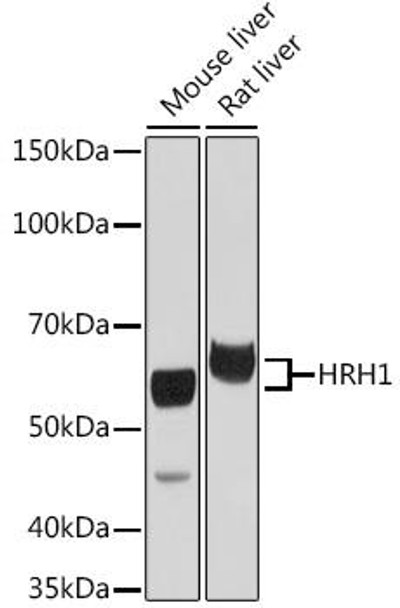Anti-HRH1 Antibody (CAB20159)
- SKU:
- CAB20159
- Product type:
- Antibody
- Antibody Type:
- Polyclonal Antibody
- Reactivity:
- Human
- Reactivity:
- Mouse
- Reactivity:
- Rat
- Host Species:
- Rabbit
- Isotype:
- IgG
- Synonyms:
- H1R
- Synonyms:
- H1-R
- Synonyms:
- HH1R
- Synonyms:
- hisH1
Description
| 抗体名: | HRH1 Rabbit pAb |
| 抗体コード: | CAB20159 |
| サイズ: | 50uL, 100uL |
| 同義語: | H1R, H1-R, HH1R, hisH1 |
| 申し込み: | WB, IF |
| 反応性: | Human, Mouse, Rat |
| 宿主種: | Rabbit |
| 免疫原: | Recombinant protein of human HRH1. |
| 申し込み: | WB, IF |
| 推奨される希釈: | WB 1:1000 - 1:2000 IF 1:50 - 1:200 |
| 反応性: | Human, Mouse, Rat |
| ポジティブサンプル: | U-251MG, Mouse liver, Rat liver |
| 免疫原: | Recombinant protein of human HRH1. |
| 精製方法: | Affinity purification |
| 保管所: | Store at -20°C. Avoid freeze / thaw cycles. Buffer: PBS with 0.02% sodium azide, 50% glycerol, pH7.3. |
| アイソタイプ: | IgG |
| 順序: | Email for sequence |
| 遺伝子ID: | 3269 |
| Uniprot: | P35367 |
| 計算された分子量: | 56kDa |
| 観察された分子量: | 60KDa |
| UniProt Protein Function: | H1R: In peripheral tissues, the H1 subclass of histamine receptors mediates the contraction of smooth muscles, increase in capillary permeability due to contraction of terminal venules, and catecholamine release from adrenal medulla, as well as mediating neurotransmission in the central nervous system. Belongs to the G-protein coupled receptor 1 family. |
| UniProt Protein Details: | Protein type:Membrane protein, integral; GPCR, family 1; Receptor, GPCR; Membrane protein, multi-pass Chromosomal Location of Human Ortholog: 3p25 Cellular Component: nucleoplasm; integral to plasma membrane; cytoplasm; plasma membrane Molecular Function:G-protein coupled receptor activity; histamine receptor activity Biological Process: G-protein coupled receptor protein signaling pathway; inositol phosphate-mediated signaling; positive regulation of vasoconstriction; eosinophil chemotaxis; visual learning; regulation of synaptic plasticity; G-protein signaling, coupled to IP3 second messenger (phospholipase C activating); positive regulation of inositol trisphosphate biosynthetic process; regulation of vascular permeability; inflammatory response; memory |
| NCBI Summary: | Histamine is a ubiquitous messenger molecule released from mast cells, enterochromaffin-like cells, and neurons. Its various actions are mediated by histamine receptors H1, H2, H3 and H4. The protein encoded by this gene is an integral membrane protein and belongs to the G protein-coupled receptor superfamily. It mediates the contraction of smooth muscles, the increase in capillary permeability due to contraction of terminal venules, the release of catecholamine from adrenal medulla, and neurotransmission in the central nervous system. It has been associated with multiple processes, including memory and learning, circadian rhythm, and thermoregulation. It is also known to contribute to the pathophysiology of allergic diseases such as atopic dermatitis, asthma, anaphylaxis and allergic rhinitis. Multiple alternatively spliced variants, encoding the same protein, have been identified. [provided by RefSeq, Jan 2015] |
| UniProt Code: | P35367 |
| NCBI GenInfo Identifier: | 547645 |
| NCBI Gene ID: | 3269 |
| NCBI Accession: | P35367.1 |
| UniProt Secondary Accession: | P35367,Q6P9E5, A8K047, |
| UniProt Related Accession: | P35367 |
| Molecular Weight: | 487 |
| NCBI Full Name: | Histamine H1 receptor |
| NCBI Synonym Full Names: | histamine receptor H1 |
| NCBI Official Symbol: | HRH1 |
| NCBI Official Synonym Symbols: | H1R; H1-R; HH1R; hisH1 |
| NCBI Protein Information: | histamine H1 receptor; histamine receptor, subclass H1 |
| UniProt Protein Name: | Histamine H1 receptor |
| Protein Family: | Histamine H1 receptor |
| UniProt Gene Name: | HRH1 |
| UniProt Entry Name: | HRH1_HUMAN |

